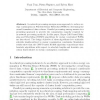Free Online Productivity Tools
i2Speak
i2Symbol
i2OCR
iTex2Img
iWeb2Print
iWeb2Shot
i2Type
iPdf2Split
iPdf2Merge
i2Bopomofo
i2Arabic
i2Style
i2Image
i2PDF
iLatex2Rtf
Sci2ools
127
click to vote
ISCIS
2005
Springer
2005
Springer
Comparison of Hyper-DAG Based Task Mapping and Scheduling Heuristics for Wireless Sensor Networks
Abstract. In-network processing emerges as an approach to reduce energy consumption in Wireless Sensor Networks (WSN) by decreasing the overall transferred data volume. Parallel processing among sensors is a promising approach to provide the computation capacity required by in-network processing methods. In this paper, Hyper-DAG based Mapping and Scheduling (HDMS) algorithms for energy constrained WSNs are introduced. The design objective of these algorithms is to minimize schedule lengths subject to energy consumption constraints. Simulation results show that the CNPT-based HDMS algorithm outperforms other heuristic algorithms with respect to schedule lengths and heuristic execution times subject to energy consumption constraints.
| Added | 27 Jun 2010 |
| Updated | 27 Jun 2010 |
| Type | Conference |
| Year | 2005 |
| Where | ISCIS |
| Authors | Yuan Tian, Füsun Özgüner, Eylem Ekici |
Comments (0)

